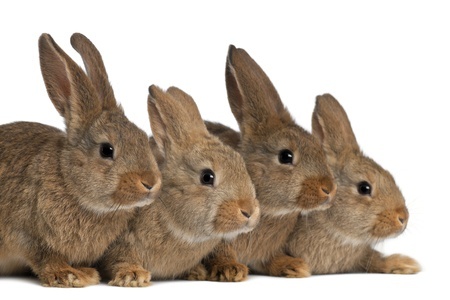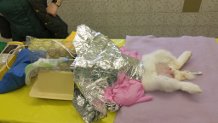Neutering

Neutered rabbits live much longer.
Neutering is often done from 5-6 months. As well as the obvious reason, to prevent repeated pregnancies, rabbits can be neutered for other reasons:
- Male rabbits are neutered to reduce aggression and spraying in the house.
- Female rabbits are neutered to reduce aggression, and to reduce the risk of cancer of the uterus (an 80% risk in females over 5 years old!).
.jpg) 30 years ago..... (David Higginson MRCVS remembers)
30 years ago..... (David Higginson MRCVS remembers)
"Neutering was rarely performed because anaesthetics were very risky. By the 1980's Daisy Street Veterinary Centre was anaesthetising rabbits regularly with a fair safety margin and were often asked for advice on rabbit anaesthesia from other practices. In 1998 we changed our anaesthetic agent from halothane to isoflurane, and the improvement has been dramatic. Coupled with very close monitoring and temperature control we are now able to anaesthetise rabbits as successfully as dogs and cats."
Care before, during and after the operation
Neutering your rabbit can be a daunting thought for owners, as many believe that rabbit anaesthetics are still unsafe. It is true that there are risks, but here at Daisy Street Vets, we continue to pride ourselves on our rabbit care.
We have very skilled, qualified nurses who are used to looking after rabbits. Rabbits needs are very different from those of dogs and cats. They require a much greater volume of anaesthetic and other medications. Did you know that a 2kg rabbit may need the same amount of pain killer as a 10kg dog! They also require skilled veterinary surgeons to anaesthetise them and place an endotracheal tube (the tube that is placed into their airway to deliver oxygen and anaesthetic gases) and then perform the tricky, tiny surgery - we are dealing with very small operation sites and rabbits skin is paper thin – have you ever tried stitching two pieces of tissue paper together without it ripping!
Our nurses, monitor the rabbits breathing rate and heart rate and use several pieces of equipment, such as a pulse oximeter (which measures the pulse rate and oxygen levels) and a Doppler (which makes a sound every time the heart beats). The simple things such as temperature control are very important in the rabbit too. These small animals can very quickly become too cold and so we use a heated pad, foil blankets and even bubble wrap to keep them warm. Even the position they are in is very important. As rabbits have such large intestines this can press on their diaphragm and make breathing difficult. So we place them in a slightly tilted position to help this. We also give our rabbits warm fluids under their skin which improves their recovery.
 Nursing care after any anaesthetic is most important. Rabbits can undergo a phenomenon called "gut stasis" following any stressful situation or illness. If their intestines stop working they can very quickly become dangerously ill and can die due to this. If your rabbit ever stops eating for several hours or a day, please remember this is an emergency and give us a call on 01254 53622 to make an appointment with one of our vets.
Nursing care after any anaesthetic is most important. Rabbits can undergo a phenomenon called "gut stasis" following any stressful situation or illness. If their intestines stop working they can very quickly become dangerously ill and can die due to this. If your rabbit ever stops eating for several hours or a day, please remember this is an emergency and give us a call on 01254 53622 to make an appointment with one of our vets.
We keep our rabbits cosy and warm as they are waking up from their operation. As soon as they are able, we start to syringe feed them special rabbit recovery food. We then offer fresh grass, dandelions and complete rabbit food, as well as often some of our own lunch such a banana or pineapple chunks. It is a wonderful feeling when a rabbit starts eating and is happy and comfortable after its operation.
If you have any questions regarding neutering your rabbit, please don't hesitate to contact us, or speak to David or Sam next time you are in the practice.

